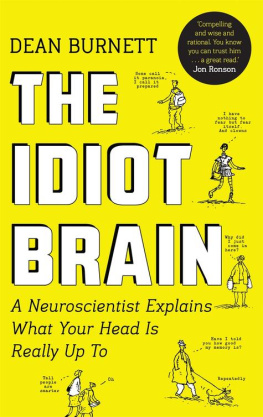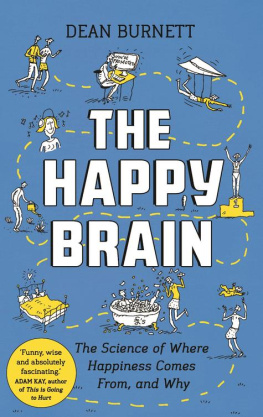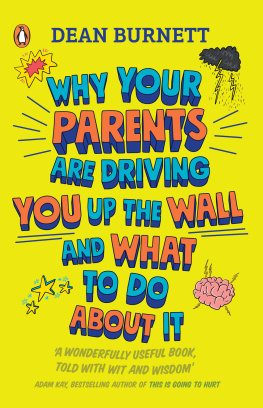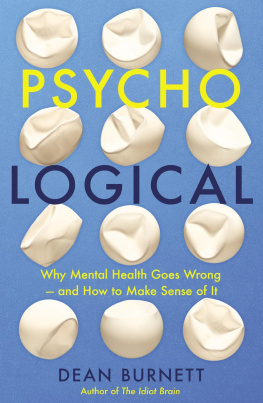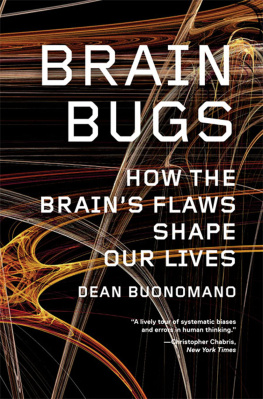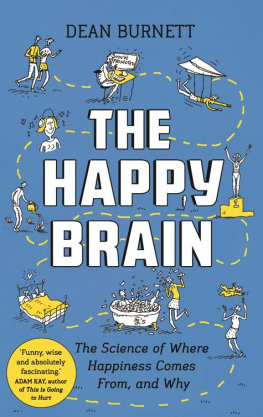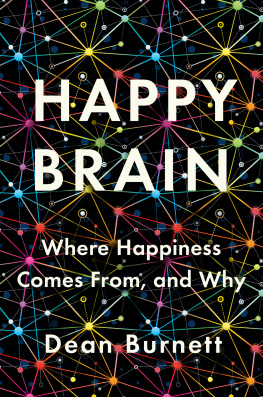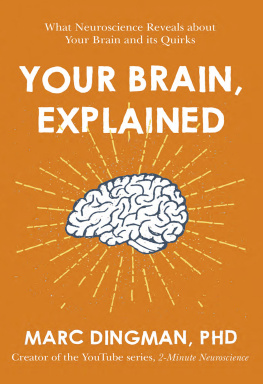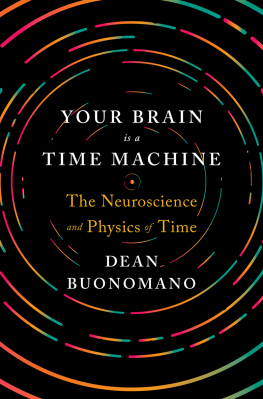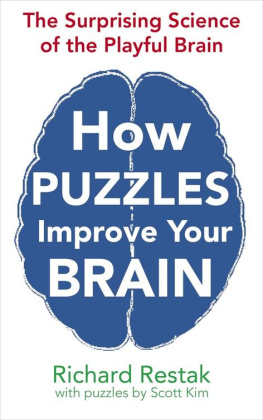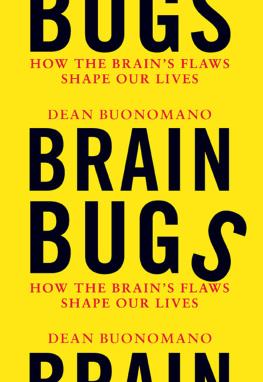Dedicated to every human with a brain.
Its not an easy thing to put up with, so well done.
This book begins the same way as nearly all my social interactions; with a series of detailed and thorough apologies.
Firstly, if you end up reading this book and not liking it, Im sorry. Its impossible to produce something that will be liked by everyone. If I could do that, Id be the democratically elected leader of the world by now. Or Dolly Parton.
To me, the subjects covered in this book, focusing on the weird and peculiar processes in the brain and the illogical behaviours they produce, are endlessly fascinating. For example, did you know that your memory is egotistical? You might think its an accurate record of things that have happened to you or stuff youve learned, but it isnt. Your memory often tweaks and adjusts the information it stores to make you look better, like a doting mother pointing out how wonderful her little Timmy was in the school play, even though little Timmy just stood there, picking his nose and dribbling.
Or how about the fact that stress can actually increase your performance at a task? Its a neurological process, not just something people say. Deadlines are one of the most common ways of inducing stress that provoke an increase in performance. If the latter chapters of this book suddenly improve in quality, you now know why.
Secondly, while this is technically a science book, if you were expecting a sober discussion of the brain and its workings, then I apologise. You wont be getting that. I am not from a traditional scientific background; Im the first out of everyone in my family to so much as think about going to university, let alone go, stay there and end up with a doctorate. It was these strange academic inclinations, so at odds with my closest relatives, that first got me into neuroscience and psychology, as I wondered, Why am I like this? I never really found a satisfying answer, but I did develop a strong interest in the brain and its workings, as well as in science in general.
Science is the work of humans. By and large, humans are messy, chaotic and illogical creatures (due largely to the workings of the human brain) and much of science reflects this. Someone decided long ago that science writing should always be lofty and serious, and this notion seems to have stuck. Most of my professional life has been dedicated to challenging it, and this book is the latest expression of that.
Thirdly, Id like to say sorry to any readers who find themselves referencing this book and subsequently losing an argument with a neuroscientist. In the world of brain sciences, our understanding changes all the time. For every claim or statement made in this book, youd probably be able to find some new study or investigation that argues against it. But, for the benefit of any newcomers to science reading, this is pretty much always the case with any area of modern science.
Fourthly, if you feel the brain is a mysterious and ineffable object, some borderline-mystical construct, the bridge between the human experience and the realm of the unknown, etc., then Im sorry; youre really not going to like this book.
Dont get me wrong, there really is nothing as baffling as the human brain; it is incredibly interesting. But theres also this bizarre impression that the brain is special, exempt from criticism, privileged in some way, and our understanding of it is so limited that weve barely scratched the surface of what its capable of. With all due respect, this is nonsense.
The brain is still an internal organ in the human body, and as such is a tangled mess of habits, traits, outdated processes and inefficient systems. In many ways, the brain is a victim of its own success; its evolved over millions of years to reach this current level of complexity, but as a result it has accrued a great deal of junk, like a hard drive riddled with old software programs and obsolete downloads that interrupt basic processes, like those cursed pop-ups offering you discount cosmetics from long-defunct websites when all youre trying to do is read an email.
Bottom line: the brain is fallible. It may be the seat of consciousness and the engine of all human experience, but its also incredibly messy and disorganised despite these profound roles. You have only to look at the thing to grasp how ridiculous it is: it resembles a mutant walnut, a Lovecraftian blancmange, a decrepit boxing glove, and so on. Its undeniably impressive, but its far from perfect, and these imperfections influence everything humans say, do and experience.
So rather than the brains more haphazard properties being downplayed or just flat out ignored, they should be emphasised, celebrated even. This book covers the many things the brain does that are downright laughable and how they affect us. It also looks at some of the ways people have thought the brain works that have proved to be way off. Readers of this book should, I hope, come away with a better and reassuring understanding of why people (or they themselves) regularly do and say such weird things, as well as with the ability to legitimately raise a sceptical eyebrow when confronted with the increasing amount of brain-based neuro-nonsense in the modern world. If this book can claim to have anything as lofty as overarching themes or aims, these are they.
And my final apology is based on the fact that a former colleague of mine once told me that Id get a book published when hell freezes over. Sorry to Satan. This must be very inconvenient for you.
Dean Burnett, PhD (no, really)
How the brain regulates the body, and usually makes a mess of things
The mechanics that allow us to think and reason and contemplate didnt exist millions of years ago. The first fish to crawl onto land aeons ago wasnt racked with self-doubt, thinking, Why am I doing this? I cant breathe up here and I dont even have any legs, whatever they are. This is the last time I play truth-or-dare with Gary. No; until relatively recently, the brain had a much more clear and simple purpose: keeping the body alive by any means necessary.
The primitive human brain was obviously successful because we as a species endured and are now the dominant life-form on earth. But despite our evolved complicated cognitive abilities, the original primitive brain functions didnt go away. If anything, they became more important; having language and reasoning skills doesnt really amount to much if you keep dying from simple things like forgetting to eat or wandering off cliffs.
The brain needs the body to sustain it, and the body needs the brain to control it and make it do necessary things. (Theyre actually far more intertwined than this description suggests, but just go with it for now.) As a result, much of the brain is dedicated to basic physiological processes, monitoring internal workings, coordinating responses to problems, cleaning up mess. Maintenance, essentially. The regions that control these fundamental aspects, the brainstem and cerebellum, are sometimes referred to as the reptile brain, emphasising their primitive nature, because its the same thing the brain was doing when we were reptiles, back in the mists of time. (Mammals were a later addition to the whole life-on-earth scene.) By contrast, all the more advanced abilities we modern humans enjoy consciousness, attention, perception, reasoning are found in the neocortex, neo meaning new. The actual arrangement is far more complex than these labels suggest, but its a useful shorthand.
So you might hope that these parts the reptile brain and the neocortex would work together harmoniously, or at least ignore each other. Some hope. If youve ever worked for someone whos a micromanager, you know how incredibly inefficient this arrangement can be. Having someone less experienced (but technically higher ranking) hovering over you, issuing ill-informed orders and asking dumb questions can only ever make it harder. The neocortex does this with the reptile brain all the time.

